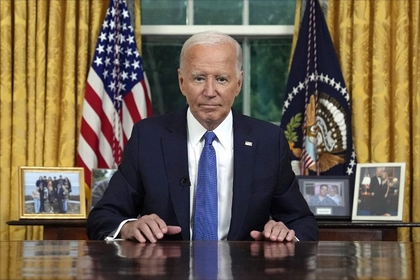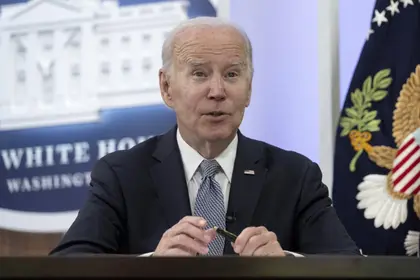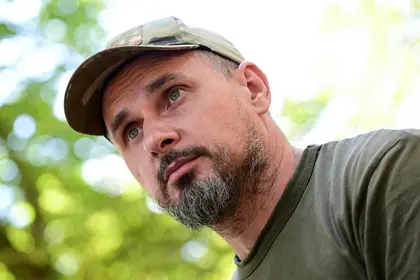As Ukraine prepares for its anticipated counteroffensive against Russia, who occupies almost a fifth of Ukraine's territory, a Politico news report, paints a picture of a White House questioning what to do if Ukraine fails to make significant gains in liberating its territory.
JOIN US ON TELEGRAM
Follow our coverage of the war on the @Kyivpost_official.
President Joe Biden, himself, has maintained that if, how and when peace talks are held it will be decision made by Ukrainian authorities alone. However, the possibility of long-term support dwindling, most especially if the Republicans gain control of the Congress in less than two years, are concerns that American officials have shared with their Kyiv counterparts. Some feel that the Russian President, Vladimir Putin, is betting that political changes, in the US and Europe, will result in a decline of military and economic support for Ukraine.
President Volodymyr Zelensky has not toned down his demands for Western nations to supply weapons so that Ukraine can successfully drive deepluy into the Russian-occupied territories. In recent months, American officials have demurred to the Ukrainian President's requests for F-16s and long range weapons, such as ATACMS. Kyiv has blamed the delays in launching the counteroffensive on failure to deliver the weapons that they have requested from Western supporters.

‘History Lies in Your Hands’ – Ukraine at War Update for July 25
Some in Washington believe that Ukraine may simply "come up short" in executing a large-scale counteroffensive - something that was referenced in top secret documents leaked several months ago by a US National Guard member. Ukraine has exhausted an incredible quantity of weapons and munitions, as well as losing significant numbers of soldiers. Politico has cited an estimate that Ukraine has had over 100,000 casualties, either injured or killed. Ukraine does not publish its casualty statistics. Russia is estimated to have suffered roughly 200,000 casualties, a stunning number for modern warfare.
Fred Hoffman, a professor of intelligence studies with over thirty years of US military experience, said to Kyiv Post that, "I think there is certainly a fear, it is kind of a zero sum game for Ukraine. Victory for Ukraine is ejecting Russia totally from the 1991 boundaries. Russia, if it keeps some of the territory, it would become a festering sore," continuing that "time always works against you if you are dependent on foreign support - people simply get conflict fatigue."
Some in Washington have raised fears that European allies, following a lackluster counteroffensive, may also seek to disengage from the war in Ukraine if it appears that the war may become a many-year venture, consuming substantial military and economic resources, that even with further financing, some in Brussels may conclude is not likely to provide a prompt Ukrainian victory.
Increased concerns of the initiation of a conflict between China and Taiwan has also sparked concerns among some policymakers that the US must do more, now, to prepare Taiwan and to cause Beijing to reconsider any adventurism to occupy the sovereign country - a multi-decade ally of the United States. Recently, Beijing has been more vocal in advocating a termination of the war against Ukraine, however many remain suspicious of Beijing's intentions.
Moscow is leading peace talks aimed at reconciling Turkish-Syrian relations. Turkey, earlier in the war, had been considered as a potential organizer of future peace talks between Russia and Ukraine.
Support for a peacefire would be unacceptable for the vast majority of Ukrainians with recent polling indicating that less than 10 percent of citizens think that Ukraine should quit the war without total victory. To assist Kyiv in managing the unpopularity of such a decision, Politico indicated Washington would not refer to the cessation of fighting as "peace negotiations," which would de facto signal that Ukraine had lost a massive part of the country, but would instead refer to the talks as a "ceasefire" that leave wiggle room for Ukrainian officials to argue that they can retake the territories at a future date.
Mark N. Katz, professor of international relations at George Mason University in the US, "If Moscow has become convinced that it cannot make any further significant territorial gains in Ukraine and may even suffer losses, then a ceasefire in place would be the least worst option.
"The Kremlin might well advertise this as 'necessary' for the peace process and not a defeat. Russian nationalists, though, will not buy this argument. Putin might be able to pull it off. But even if everyone else in Russia becomes convinced that Moscow can't do better than a ceasefire, it is not clear that Putin will—or think he can afford to."
Current numbers indicate that unemployment in Ukraine is around 25% and millions of citizens have left the country. Failure to definitively resolve the Russian invasion would complicate Ukraine's efforts to attract investments and to rebuild.
Russia would likely welcome a ceasefire as it would provide a "victory" for Putin, who could argue to his population at home that they were stopping only due to the constraints of the multilateral peace negotiations, not as a result of the Russian military's impotence in attempts to occupy Ukraine.
Ian Garner, a scholar of Russian culture and war propaganda said that most of Russia would likely be relieved by a ceasefire, but "Vladimir Putin doesn't fear any outcome until Russia itself begins to collapse. The Kremlin's media machine will easily spin a ceasefire as a victory: in their narrative, Russia will have 'saved' the east of Ukraine and its population from monstrous Ukrainian Nazis, so the goals of the 'special military operation' can be declared complete."
Garner argues that in reality, "Putin's biggest victory from a ceasefire will be the chance to rebuild his forces, shore up the propaganda narrative of Russia's imperial strength, and attempt to stave off economic strife. Meanwhile, Russia will still occupy parts of Ukraine, providing a springboard for potential future offensives.
However, if Putin does not accept a ceasefire, it could suggest that "his war against Ukraine is as ideologically motivated as some scholars fear. If that is the case, we should be deeply alarmed," noted the scholar who recently published a book on Russian fascist youth movements.
Such a "victory" for Russia could embolden the leader and would sink hopes of seeing a political change soon in Russia. Recent economic data in Russia, with the Ruble having lost nearly 50% of its value over the past half-a-year could lead to the weakening of Putin, making him yet more unprepared for a contracted war in Ukraine as international sanctions continue to weigh-down his nation's economy.
Ukrainian authorities have said that they would not consider direct talks with the Russian leader, who is wanted by the International Criminal Court (ICC) for war crimes, nor would Ukrainian leaders likely feel comfortable in trusting the Russian autocrat who began his invasion of Ukraine in 2014, before the renewed attempts in 2022. Despite Russia's guarantees of not invading Ukraine, in the Budapest Memorandum and in later talks, Russia has not honored its commitments and there would be no sense of security for Ukrainians in taking the risk of trusting Moscow, due to foreign pressure, again.
Politico says that Ukraine might be the recipient of various "incentives" to encourage it to take-up peace talks, including receiving more Western weapons, NATO-like security guarantees, and economic aid from European countries. The current estimate to rebuild Ukraine, according to the KSE Institute, is around $ 143.8 Billion - a number that Kyiv could only hope to reach with substantial foreign assistance.
As all eyes are looking to the east and south of Ukraine, awaiting the launch of the long awaited counteroffensive, there is an increasing nervousness in Washington of what will come after.
You can also highlight the text and press Ctrl + Enter






